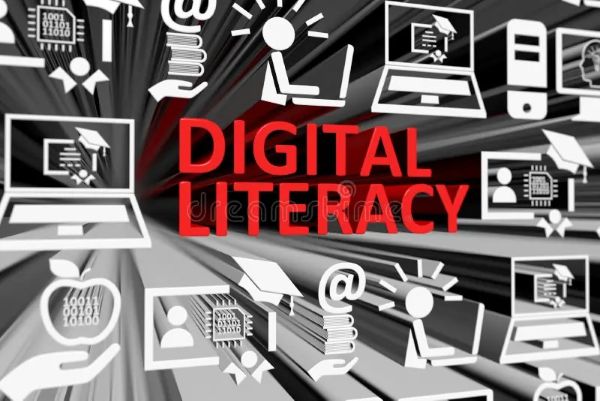Exploring Nigeria’s digital literacy and NITDA’s 2027 plan
“Digital literacy is the foundation for participating in a digital economy..."
 By Ijeoma Olorunfemi
By Ijeoma Olorunfemi
Digital literacy has become a cornerstone for economic growth and social inclusion in the 21st century.
Countries like South Korea and Estonia have set global benchmarks with robust frameworks and near-universal internet access, while Nigeria struggles to bridge the digital divide.
These challenges include infrastructural deficits, limited internet penetration, and high costs of digital tools.
When compared to South Korea and Estonia, the gap in digital literacy becomes evident.
Both countries boast modern infrastructure and comprehensive integration of digital skills into their education systems.
Poor digital banking services frustrating Nigerians
Estonia, for instance, incorporates e-Governance and digital learning from early education, fostering inclusivity and efficiency in its digital economy.
On the other hand, Nigeria faces some obstacles, such as unreliable electricity, limited broadband access, and a growing disparity between urban and rural communities where basic digital infrastructure is scarce.
To address these challenges, the National Information Technology Development Agency (NITDA) launched the Strategic Roadmap and Action Plan (SRAP) 2.0 earlier this year.
Spanning 2024 to 2027, the initiative is designed to enhance IT skills among Nigerians and foster a resilient, inclusive, and prosperous digital Nigeria.
Aligning with the Ministry of Communications and Digital Economy’s broader vision, SRAP focuses on eight strategic pillars.
These include; fostering digital literacy, cultivating talent, promoting innovation, and building robust technological and policy frameworks among others.
Malam Kashifu Inuwa, Director-General of NITDA, recently underscored the agency’s prioritisation of digital literacy and talent cultivation, noting that these efforts reinforce other SRAP objectives.
He aligned this vision with President Bola Tinubu’s agenda to accelerate economic diversification through industrialisation, digitisation, and innovation.
“This presents a significant opportunity for Nigeria to emerge as a global digital talent powerhouse, especially with its young population combined with increasing digital engagement,” Inuwa said.
He cited a Korn Ferry report that predicts a global talent shortage of 85 million by 2030, potentially costing $8.5 trillion in unrealised annual revenue.
He also referenced a 2022 PwC report, ‘Nigerian Brain Exports: The Optimal Path to Growing the Nigerian Economy’, which shows the country’s potential to lead in exporting digital skills and services.
To achieve these ambitious goals, NITDA launched the Digital Literacy for All Initiative (DL4ALL) to ensure universal digital literacy by 2027.
The programme seeks to equip Nigerians with essential digital skills for education, employment, and safe online navigation.
“DL4ALL is geared towards communicating, collaborating effectively using digital tools, and developing the digital fluency required for many in-demand jobs,” Inuwa added.
Recognising the vast rural-urban digital divide, NITDA partnered with the National Youth Service Corps (NYSC) to train 30 million Nigerians, particularly youth, in digital skills.
Corps members are integral to the initiative’s success, delivering training across the nation’s 774 Local Government Areas.
The pilot phase of the programme was floated in 12 states, which included Kebbi, Jigawa, Gombe State, Kwara, Ekiti, Osun, Cross River, Bayelsa, Abia, Ebonyi and the FCT.
In spite of these efforts, experts highlight the gaps that persist.
Dr Niran Oyekale, Executive Chairman of Commit Technology and Consult Limited, identified a disconnect between educational outcomes and labour market demands.
“There is inadequate integration of digital literacy in the educational curriculum at all levels of Nigeria’s education system,” he noted.
Oyekale proposed adopting the Future-Proof Economy (FPE) Model, which targets the training and certification of 70 million Nigerians by 2027.
The expert believes that legislative and policy reforms are needed to promote digital literacy, including the establishment of a Nigeria Digital Literacy Management Office (NDLMO).
These reforms would involve drafting an Executive Bill to formalise the NDLMO and advance digital literacy and technologies.
“Inclusion of digital literacy modules at primary, secondary, and tertiary education levels is essential, along with updating national learning standards to meet 21st-century demands.
“There is also a need for digital literacy to be incorporated into the West African Examination Council, Joint Admission and Matriculation Board, Direct Entry admissions, and Postgraduate admissions,” Oyekale said.
Similarly, technology expert Jide Awe emphasised the importance of addressing structural challenges, such as inadequate infrastructure and insufficient public awareness of digital literacy’s benefits.
“Digital literacy is the foundation for participating in a digital economy, and for a country like Nigeria, we should have 80-90 per cent of the populace who are digitally literate to tap into the opportunities of the digital economy,” he stated.
Data analyst Chinemerem Ndubisi shared similar sentiments, pointing out that many rural communities lack access to electricity and internet connectivity, essential for digital learning.
According to him, the average Nigerian does not have access to laptop, good internet and steady electricity that facilitate the learning of digital skills.
“2027 is a short time and for the government to embark on the goal there should be a plan and timeline to provide necessary infrastructure.
“There are rural communities that don’t have access to electricity, internet coverage and connectivity, these people should be carried along so that there are no gaps and ensuring digital inclusion”.
In conclusion, Nigeria’s journey towards digital literacy is ambitious but laden with challenges.
Stakeholders agree that addressing infrastructural deficits, aligning educational curricula with labour market demands, and fostering public-private partnerships are crucial for success.
With a data-driven and inclusive approach, Nigeria can harness its youthful population to bridge the global talent gap, drive sustainable growth, and position itself as a leader in the digital economy.
News Agency of Nigeria.












